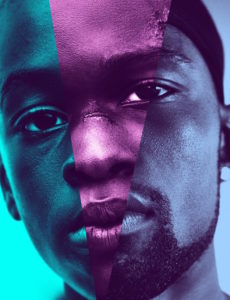Moonlight, the winner of the Academy Award for Best Motion Picture of 2016, depicts the lives of Black people in Florida: economic hardship, violence, drugs, a life of misery with almost no escape. The film presents three stages in the life of Chiron, its main character: as a child, an adolescent, and an adult. We witness him mature from a frightened boy into a threatening drug dealer.
Chiron is raised by a drug-addicted single mother who sometimes turns to prostitution for survival. Children bully him, and he comes under the protection of Juan, a drug dealer. Juan takes him to his home, where he lives with his girlfriend, and there Chiron finds the shelter and warmth that he lacks at home. But after he finds Juan sell drugs to his mother he leaves, returning to this home only after Juan’s death.
In the second part Chiron is a teenager, still being bullied by his classmates and living with his drug-addict mother. Only one boy, Kevin, become his friend. In a moment of emotional intimacy a certain sexual encounter develops. But later, his classmates forces Kevin to hit Chiron, who is left bleeding and crying on the floor. This part ends with Chiron returning to his classroom — his face revealing that can’t take the misery any more — grabbing a chair and breaking it on the back of one of his abusers.
In the third part of the movie, Chiron is a muscular young man, a scary drug dealer in Atlanta. His mother has gone into rehab. To his utter surprise Kevin, who he hasn’t seen for years, calls him. Chiron decided to drive to Florida to meet him. The encounter between them is the climax of the film. We find that Chiron had been in love with Kevin for years, and since their sexual encounter he had not been with anyone else. In Kevin’s house by the sea, Chiron gently rests his head on his lover’s shoulder.
The film was highly praised for a complex presentation of life of poverty and the development of homosexual identity. Slums are imbued with violence – but also with grace and generosity. And the discovery of a homosexual identity is a complicated process of self-acknowledgement.
But if we examine the story from a universal perspective, we find an old-fashioned love story – one that is rarely seen in fiction and in cinema today. For the sake of argument, let’s try to describe the story as a relationship between a man and a woman: the male protagonist falls in love with a woman in his youth and has a limited sexual encounter with her. She leaves, but the memory of the happy moment a prevents him from engaging with other women for years. As they meet again he gently confesses his love and rests his head on her shoulder. Would the spectators believe such a story?
The absolute link between feelings and sexual attraction, time that stops after an encounter with the loved one, years of yearning for him, the tender sexual relations – the great love stories of the nineteenth and twentieth century were made of such materials. Moonlight is a story about profound love, lacking any skepticism, almost anachronistic. A story more typical of our days would present Chiron having sex without love, perceiving the connection with Kevin in a different light as time goes by, and developing meaningful emotional relations with another man.
But Moonlight is a monumental love story – like Anna Karenina or Casablanca, and perhaps mostly like Thomas Mann’s Death in Venice. But unlike these love stories, it takes place in the lowest social layer, among people whose lives are almost entirely determined by their being born into poverty; very few – like Kevin – manage to break out of violence and drugs.
The poor social circumstances emphasize Chiron’s unique character, making his love even more astonishing. But isn’t this a distorted perception of poverty? A romanticization of deprivation and violence? A similar argument had been put forwards against Dostoevsky’s writing. It has been suggested that his portrayal of love and generosity emerging especially in hardship justifies poverty, makes it valuable, and undermines any efforts to eradicate it.
Kevin, unlike Chiron, leaves the criminal life. He works as a cook, and he fathers a child. He states that though his life is not perfect, he is happy. Here, again, the film agrees with the spirit of monumental love stories: they drive the protagonist to outstanding pinnacles and disheartening falls – but not to a happy life.

Thanks, Yasmine. All the very best to you!
Greetings Emanuela, and many thanks… 😊
I thoroughly enjoyed reading this extraordinary survey.